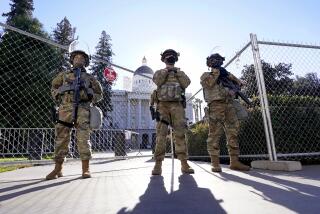Army general to decide if Bowe Bergdahl should face charges
The Army has referred its findings on the disappearance of Sgt. Bowe Bergdahl to a senior official who will determine whether Bergdahl will face criminal charges, it was announced Monday.
The case is being sent to a general courts-martial convening authority, Gen. Mark Milley, commanding general of Forces Command, the Department of Defense announced. Milley will determine the next step in the case, which could include convening a court-martial to taking no futher action against the soldier.
“This is equivalent in the civilian world to the police concluding their investigation and handing the case to a district attorney to decide whether to prosecute,” Army spokesman Wayne V. Hall told the Los Angeles Times.
There is no deadline for when Gen. Milley must act, Hall said.
Hall refused to discuss whether the investigation makes any recommendations in the Bergdahl case. The investigative report was not released.
Bergdahl disappeared June 30, 2009, reportedly walking away from his unit after expressing misgivings about the U.S. military’s role in Afghanistan. He was captured by the Taliban and held by members of the Haqqani network, which operates in Pakistan and Afghanistan.
On May 31, Bergdahl was handed over to U.S. special forces in Afghanistan in exchange for five top Taliban commanders who had been imprisoned at Guantanamo Bay, Cuba, and who were sent to Qatar. After spending about two weeks recuperating at a U.S. military hospital in Germany, Bergdahl was sent to Brooke Army Medical Center at Ft. Sam Houston in Texas on June 13.
An initial Army investigation concluded that Bergdahl, now 28, left his remote base in eastern Afghanistan without permission. His motive remains unclear.
Bergdahl has said he was kept in a small, confined space after he made an escape attempt and was recaptured, and he told military doctors he was the victim of abuse during his years in captivity.
Although negotiations between the U.S. and the Haqqani network were handled through intermediaries in Qatar, some legislators have also questioned whether the U.S. violated its policy of not negotiating with terrorists in securing Bergdahl’s freedom.
His hometown of Hailey, Idaho, had initially planned a welcome home celebration but canceled the event amid security issues.
The investigation could include recommendations on whether Bergdahl should be charged with any criminal violations or forced to leave the Army. Any final disposition will eventually also determine whether Bergdahl gets as much as $300,000 in back pay and other benefits, including healthcare.
Follow @latimesmuskal for national news
More to Read
Sign up for Essential California
The most important California stories and recommendations in your inbox every morning.
You may occasionally receive promotional content from the Los Angeles Times.











